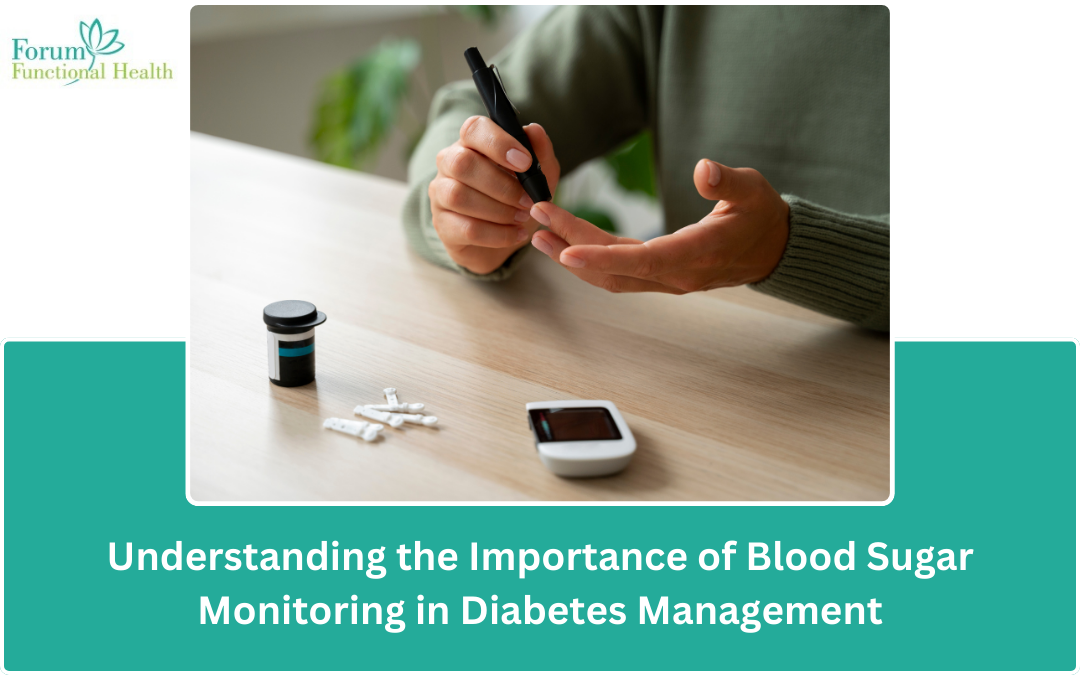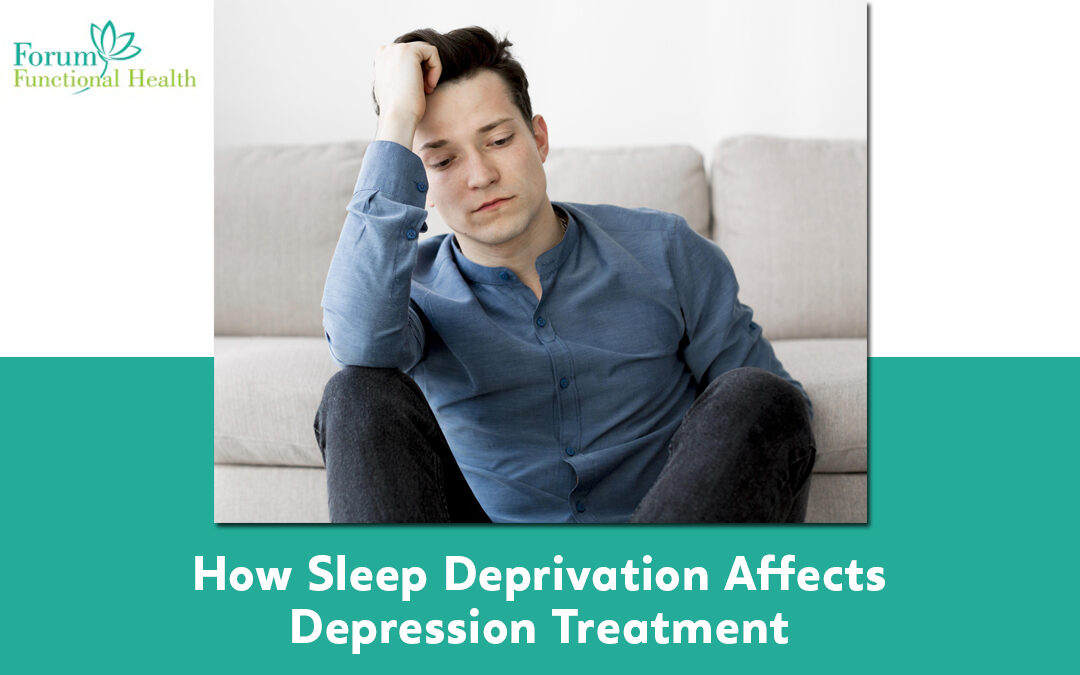
by Forum Functional Health Center | Mar 6, 2024 | Diabetes Management
Living with diabetes demands constant vigilance and management. Among the myriad of responsibilities, monitoring blood sugar levels stands out as a cornerstone of effective diabetes care. Whether you’re newly diagnosed or a seasoned veteran in managing your condition, understanding the significance of blood sugar monitoring is paramount. In this comprehensive guide, we’ll delve into the intricacies of blood sugar monitoring, its impact on Diabetes Management, and how it empowers individuals to take control of their health.
Why Blood Sugar Monitoring Matters in Diabetes Management
Blood sugar monitoring, also known as glucose monitoring, involves regularly measuring the concentration of glucose in your bloodstream. For individuals with diabetes, this practice is essential as it provides invaluable insights into how the body processes glucose, the primary energy source. By monitoring blood sugar levels, individuals can:
Maintain Glycemic Control: Consistently high blood sugar levels (hyperglycemia) can lead to a myriad of complications such as cardiovascular diseases, neuropathy, and kidney damage. Conversely, low blood sugar levels (hypoglycemia) can cause dizziness, confusion, and in severe cases, loss of consciousness. Regular monitoring allows individuals to adjust their treatment regimen, including medication dosage and dietary choices, to maintain optimal glycemic control.
Prevent Diabetes Complications: Diabetes is a complex condition that affects multiple organ systems in the body. Monitoring blood sugar levels helps identify fluctuations that may contribute to long-term complications such as diabetic retinopathy, neuropathy, and cardiovascular disease. By staying proactive and vigilant, individuals can mitigate the risk of developing these debilitating complications.
Inform Treatment Decisions: Diabetes management is highly individualized, and what works for one person may not be suitable for another. Blood sugar monitoring provides actionable data that healthcare providers can use to tailor treatment plans according to each individual’s needs. Whether it’s adjusting medication, fine-tuning insulin doses, or recommending lifestyle modifications, informed decisions based on blood sugar data are key to optimizing treatment outcomes.
Empower Self-Management: Diabetes is a lifelong condition that requires active participation from the individual. By incorporating blood sugar monitoring into their daily routine, individuals gain a deeper understanding of how their lifestyle choices impact their health. This awareness empowers them to make informed decisions regarding diet, exercise, and stress management, ultimately leading to better long-term health outcomes.
Practical Tips for Effective Blood Sugar Monitoring
Now that we’ve established the importance of blood sugar monitoring, let’s explore some practical tips to ensure its effectiveness:
Choose the Right Monitoring Device: With advancements in technology, there is a wide array of blood glucose monitoring devices available on the market, ranging from traditional glucometers to continuous glucose monitors (CGMs). Work with your healthcare provider to select the device that best suits your needs and lifestyle.
Establish a Monitoring Routine: Consistency is key when it comes to blood sugar monitoring. Set a schedule for checking your blood sugar levels, taking into account factors such as meal times, physical activity, and medication dosing. Incorporate monitoring into your daily routine to make it a habit.
Keep Detailed Records: Maintain a logbook or use digital apps to record your blood sugar readings, along with relevant information such as meal times, exercise, medication dosage, and any symptoms you may experience. This data provides valuable insights for both you and your healthcare provider to identify patterns and make informed adjustments to your treatment plan.
Stay Educated: Keep abreast of the latest developments in diabetes management and blood sugar monitoring techniques. Attend educational workshops, read reputable sources, and engage with online communities to learn from others’ experiences and stay motivated on your journey.
Forum Functional Health Care Integration
Incorporating blood sugar monitoring into the broader framework of functional healthcare is essential for providing comprehensive diabetes management. Functional healthcare emphasizes a holistic approach that addresses the root causes of illness, rather than simply managing symptoms. By integrating blood sugar monitoring into Forum Functional healthcare practices, healthcare providers can offer personalized, patient-centered care that empowers individuals to take control of their health.
Forum Functional Healthcare places a strong emphasis on patient education and empowerment. Through personalized coaching, nutritional guidance, and lifestyle interventions, individuals are equipped with the knowledge and skills to make informed decisions about their health. Blood sugar monitoring becomes not just a routine task, but a powerful tool for self-awareness and proactive management of diabetes.
Blood sugar monitoring plays a pivotal role in diabetes management, offering invaluable insights into metabolic health and guiding personalized treatment strategies. By integrating blood sugar monitoring into the framework of functional healthcare, we can offer individuals with diabetes comprehensive support that addresses their unique needs and empowers them to live vibrant, healthy lives.
By embracing a holistic approach that prioritizes education, empowerment, and personalized care, we can revolutionize diabetes management and improve outcomes for individuals living with this chronic condition.

by Forum Functional Health Center | Mar 4, 2024 | Weight Management
Starting a weight loss journey may be both inspiring and challenging. It demands commitment, consistency, and a desire to make lifestyle adjustments. While food and exercise are well recognized as important aspects of healthy weight management, the influence of stress is sometimes underestimated. However, stress can have a big impact on your weight loss efforts, potentially impeding progress and jeopardizing your goals. Understanding how stress affects your body and using techniques to lessen its effects is critical for long-term success in your weight reduction journey.
The Stress-Weight Connection
To comprehend the relationship between stress and weight loss, it’s important to delve into the physiological mechanisms at play. When you experience stress, your body initiates a series of responses designed to cope with perceived threats. This triggers the release of hormones like cortisol, often referred to as the “stress hormone.” While cortisol serves a vital function in mobilizing energy reserves for fight-or-flight responses, chronic stress can lead to dysregulation of cortisol levels.
How Stress Affects Weight Loss
Increased Appetite: Cortisol stimulates appetite and cravings, particularly for high-calorie, sugary, and fatty foods. This can lead to overeating and sabotage your weight loss efforts.
Fat Storage: Elevated cortisol levels promote fat storage, particularly visceral fat around the abdomen. This not only affects your appearance but also increases the risk of various health conditions, including cardiovascular disease and type 2 diabetes.
Metabolic Changes: Chronic stress can impair metabolic function, making it more difficult for your body to burn calories efficiently. This can contribute to weight gain or hinder weight loss progress.
Emotional Eating: Many individuals turn to food as a coping mechanism in response to stress, leading to emotional eating behaviors. This pattern can perpetuate a cycle of stress, overeating, and weight gain.
Strategies to Manage Stress for Weight Loss Success
Mindfulness and Meditation: Incorporating mindfulness practices such as meditation, deep breathing exercises, and yoga can help reduce stress levels and promote emotional well-being.
Regular Exercise: Physical activity is not only beneficial for weight loss but also serves as a powerful stress-reliever. Engage in activities you enjoy, whether it’s walking, jogging, dancing, or practicing martial arts.
Healthy Coping Mechanisms: Identify alternative coping mechanisms to manage stress instead of turning to food. This could include journaling, spending time in nature, listening to music, or connecting with loved ones.
Prioritize Sleep: Adequate sleep is essential for stress management and weight loss. Aim for 7-9 hours of quality sleep each night to support overall well-being.
Nutritious Diet: Focus on nourishing your body with whole, nutrient-dense foods that support stress resilience and weight loss. Include plenty of fruits, vegetables, lean proteins, and healthy fats in your meals.
Seek Support: Don’t hesitate to reach out to friends, family, or a professional counselor for support during challenging times. Talking about your feelings and experiences can help alleviate stress and foster a sense of connection.
Forum Functional Health Center Approach
At Forum Functional Health Center, we recognize that each individual’s weight management journey is unique. Our comprehensive approach encompasses personalized protocols tailored to address specific needs and challenges. This includes:
Supplements: We offer targeted supplements designed to support stress management, metabolism, and overall well-being, enhancing your body’s ability to achieve and maintain a healthy weight.
Customized Nutritional Support: Our team of experts will work closely with you to develop a customized nutrition plan tailored to your preferences, dietary requirements, and weight loss goals.
Education and Guidance: Empowering you with the knowledge and tools necessary for sustainable weight loss success is a cornerstone of our approach. We provide education on stress management strategies, mindful eating practices, and lifestyle modifications to support your journey.
Lifestyle Modifications: We recognize the importance of addressing lifestyle factors that impact weight management, including stress, sleep, physical activity, and social support. Our holistic approach focuses on empowering you to make sustainable lifestyle changes that promote overall health and well-being.
By addressing the underlying factors contributing to stress and incorporating targeted interventions, we can optimize your body’s ability to achieve lasting weight loss results. At Forum Functional Health Center, we are committed to supporting you every step of the way on your journey to improved health and vitality.
Stress can exert a significant impact on your weight loss journey, affecting appetite, metabolism, and emotional well-being. However, by implementing effective stress management strategies and seeking personalized support, you can overcome these challenges and achieve your weight loss goals. At Forum Functional Health Center, our integrated approach addresses the complex interplay between stress and weight management, empowering you to reclaim control of your health and vitality.

by Forum Functional Health Center | Mar 2, 2024 | Hormone Health
Maintaining optimal health involves various factors, and hormonal balance plays a crucial role in overall well-being. Hormones act as messengers in the body, regulating essential functions such as metabolism, mood, reproductive health, and more. However, hormonal imbalances can lead to a wide range of health issues. Regular hormone testing is essential for identifying imbalances early and taking proactive steps to maintain overall health.
Understanding Hormonal Balance
Hormones are chemical messengers produced by various glands in the endocrine system. These include glands such as the thyroid, adrenal, pituitary, pancreas, and reproductive organs. Hormones regulate numerous bodily functions, including metabolism, growth and development, mood, sleep, and reproductive health.
Common Hormonal Imbalances: Several factors can disrupt hormonal balance, including stress, poor diet, and lack of exercise, environmental toxins, and certain medical conditions.
Thyroid Imbalance: The thyroid gland produces hormones that regulate metabolism. An underactive or overactive thyroid can lead to symptoms such as fatigue, weight gain or loss, and changes in mood.
Adrenal Imbalance: The adrenal glands produce hormones such as cortisol, which help the body respond to stress. Chronic stress can lead to adrenal fatigue or dysfunction, resulting in symptoms like fatigue, anxiety, and sleep disturbances.
Sex Hormone Imbalance: Imbalances in sex hormones such as estrogen, progesterone, and testosterone can affect reproductive health, mood, libido, and overall well-being. Symptoms may include irregular menstrual cycles, infertility, mood swings, and decreased sex drive.
Importance of Regular Hormone Testing
Regular hormone testing is essential for several reasons
Early Detection of Imbalances: Hormonal imbalances often develop gradually and may not cause noticeable symptoms initially. Regular testing allows for early detection, enabling prompt intervention before imbalances worsen and lead to significant health issues.
Personalized Treatment: Once hormonal imbalances are identified, healthcare providers can develop personalized treatment plans tailored to individual needs. This may include lifestyle modifications, dietary changes, hormone replacement therapy, or other interventions.
Prevention of Health Complications: Untreated hormonal imbalances can increase the risk of various health complications, including cardiovascular disease, osteoporosis, diabetes, and reproductive disorders. Regular testing and timely intervention can help prevent these complications.
Monitoring Treatment Effectiveness: Regular testing allows healthcare providers to monitor treatment effectiveness and make adjustments as needed to optimize outcomes for individuals undergoing hormone therapy or other interventions to address imbalances.
Methods of Hormone Testing
Several methods are available for hormone testing, including blood tests, saliva tests, urine tests, and specialized functional medicine tests. Each method has its advantages and may be used depending on the specific hormones being assessed and individual preferences.
Blood Tests: Blood tests are commonly used to measure hormone levels in the body. They provide a snapshot of hormone levels at a specific point in time and can assess various hormones, including thyroid hormones, sex hormones, cortisol, and insulin.
Saliva Tests: Saliva tests measure the levels of free, unbound hormones in saliva samples. This method is often used to assess cortisol levels throughout the day and can provide valuable insights into adrenal function and stress response.
Urine Tests: Urine tests measure hormone metabolites excreted in urine, providing information about hormone levels and metabolism over a longer period than blood or saliva tests. This method is particularly useful for assessing estrogen metabolism and hormone balance.
Functional Medicine Tests: Functional medicine tests may include comprehensive hormone panels that assess multiple hormones and biomarkers associated with hormonal balance, inflammation, and other factors influencing health. These tests offer a more holistic approach to evaluating overall wellness.
Maintaining hormonal balance is essential for overall health and well-being. Regular hormone testing is a valuable tool for identifying imbalances early, personalizing treatment approaches, and preventing health complications. Whether through blood tests, saliva tests, urine tests, or functional medicine tests, monitoring hormone levels regularly can empower individuals to take proactive steps towards optimizing their health.
Forum Functional Health serves as a central hub for individuals passionate about proactive health management. Members can share their experiences with hormone testing, discuss treatment strategies, and access resources to support their wellness journey. Engage with like-minded individuals, learn from experts, and stay informed about the latest advancements in hormone optimization. Join the forum today to take control of your health and well-being.

by Forum Functional Health Center | Mar 1, 2024 | Menopause & Perimenopause
Before diving into how diet and exercise can ease premenopause symptoms, let’s first grasp what premenopause entails. Premenopause refers to the transitional phase leading up to menopause, typically occurring in a woman’s 40s or early 50s. During this time, hormonal fluctuations may trigger various physical and emotional symptoms, such as hot flashes, mood swings, weight gain, and sleep disturbances.
Balanced Diet: Fueling Your Body Right
Eating a balanced diet plays a crucial role in managing premenopause symptoms. Here’s how:
A. Incorporate Phytoestrogens: Phytoestrogens are plant-based compounds that mimic estrogen in the body. They can help alleviate hot flashes and other symptoms associated with hormonal changes. Foods rich in phytoestrogens include soy products (tofu, soy milk), flaxseeds, chickpeas, lentils, and sesame seeds.
B. Focus on Whole Foods: Opt for whole, nutrient-dense foods such as fruits, vegetables, whole grains, lean proteins, and healthy fats. These foods provide essential vitamins, minerals, and antioxidants, supporting overall health and hormone balance.
C. Limit Caffeine and Alcohol: Excessive consumption of caffeine and alcohol can exacerbate premenopause symptoms like hot flashes and sleep disturbances. Limit intake or opt for decaffeinated beverages and moderate alcohol consumption.
D. Stay Hydrated: Drinking an adequate amount of water is essential for managing various premenopause symptoms, including bloating, headaches, and fatigue. Aim for at least eight glasses of water per day.
Exercise: Movement for Relief
Regular physical activity is beneficial for mitigating premenopause symptoms and improving overall well-being. Here’s how exercise can help
A. Reduce Hot Flashes: Engaging in aerobic exercise, such as brisk walking, cycling, or swimming, can help reduce the frequency and intensity of hot flashes. Aim for at least 30 minutes of moderate-intensity exercise most days of the week.
B. Boost Mood and Energy: Exercise stimulates the release of endorphins, neurotransmitters that promote feelings of happiness and reduce stress and anxiety. Incorporating activities like yoga, Pilates, or dance can also enhance flexibility, balance, and relaxation.
C. Maintain Healthy Weight: As women approach menopause, hormonal changes can lead to weight gain, particularly around the abdomen. Regular exercise, combined with a balanced diet, can help prevent weight gain and promote weight loss by boosting metabolism and building lean muscle mass.
D. Improve Sleep Quality: Regular physical activity can improve sleep quality by promoting relaxation and reducing symptoms such as anxiety and restlessness. However, it’s essential to avoid vigorous exercise close to bedtime, as it may interfere with sleep.
Stress Management: Finding Balance
Chronic stress can exacerbate premenopause symptoms such as mood swings, irritability, and fatigue. Incorporating stress-reducing techniques into your daily routine can help alleviate these symptoms:
A. Practice Mindfulness and Meditation: Mindfulness practices, such as meditation, deep breathing, and progressive muscle relaxation, can help calm the mind, reduce stress, and promote emotional well-being.
B. Prioritize Self-Care: Make time for activities that bring you joy and relaxation, whether it’s reading a book, taking a bath, or spending time outdoors. Prioritizing self-care is essential for managing stress and nurturing your overall health.
C. Seek Support: Surround yourself with supportive friends, family members, or a therapist who can offer guidance, empathy, and encouragement during this transitional phase of life.
Supporting Premenopause Wellness at Forum Functional Health Center
At Forum Functional Health Center, we understand the importance of holistic approaches to women’s health, especially during the premenopause phase. Our comprehensive approach focuses on empowering women to manage premenopause symptoms effectively and enhance their overall well-being.
1. Personalized Nutrition Plans: Our experienced nutritionists craft personalized meal plans tailored to each woman’s unique dietary needs and preferences. By emphasizing whole, nutrient-dense foods and incorporating phytoestrogen-rich options, we aim to support hormone balance and alleviate troublesome symptoms.
2. Customized Exercise Programs: Our certified fitness trainers develop customized exercise programs designed to address premenopause symptoms and promote optimal physical health. Whether it’s incorporating aerobic activities to reduce hot flashes or strength training to maintain muscle mass and bone density, we ensure that each workout plan aligns with individual goals and capabilities.
3. Stress Management Strategies: At Forum Functional Health Center, we offer various stress management techniques, including mindfulness practices, meditation sessions, and relaxation therapies. By learning effective stress reduction strategies, women can better cope with the emotional and psychological challenges associated with premenopause, leading to improved mood and overall quality of life.
4. Ongoing Support and Guidance: Our compassionate team provides ongoing support and guidance to women navigating the premenopause phase. Whether it’s through one-on-one counseling sessions, group workshops, or online resources, we are committed to helping women feel empowered and informed throughout their journey.
At Forum Functional Health Center, we believe that by adopting a balanced approach to nutrition, exercise, and stress management, women can navigate the premenopause phase with greater ease and vitality. Together, we can support women in achieving optimal health and well-being during this transformative time of life.

by Forum Functional Health Center | Feb 28, 2024 | Digestive Health
In today’s fast-paced world, digestive problems have become increasingly prevalent, affecting millions of people worldwide. From occasional discomfort to chronic conditions, such as irritable bowel syndrome (IBS) and inflammatory bowel disease (IBD), digestive issues can significantly impact one’s quality of life. Fortunately, many effective strategies can help restore gut health naturally, providing relief from common digestive ailments. In this comprehensive guide, we will explore these strategies and empower you to take control of your digestive wellness.
Understanding Gut Health: The Key to Overall Well-Being
Before delving into specific strategies, it’s essential to understand the significance of gut health. The gut, often referred to as the “second brain,” plays a crucial role in digestion, nutrient absorption, immune function, and even mood regulation. A healthy gut is characterized by a diverse and balanced microbiome the community of beneficial bacteria residing in the gastrointestinal tract. When this delicate balance is disrupted, it can lead to various digestive issues and compromise overall well-being.
Identifying Common Digestive Issues
To effectively address digestive problems, it’s essential to recognize the signs and symptoms associated with common gastrointestinal disorders. These may include
Acid Reflux and Heartburn: Characterized by a burning sensation in the chest, acid reflux occurs when stomach acid flows back into the esophagus, leading to discomfort and irritation.
Bloating and Gas: Excessive gas production and bloating can result from various factors, including poor digestion, food intolerances, and imbalanced gut flora.
Constipation: Difficulty passing stools or infrequent bowel movements may indicate underlying issues with gastrointestinal motility or inadequate fiber intake.
Diarrhea: Loose, watery stools accompanied by urgency and abdominal cramping are common symptoms of diarrhea, which can be caused by infections, food intolerances, or underlying health conditions.
Strategies for Restoring Gut Health Naturally
Now that we have a better understanding of common digestive issues, let’s explore practical strategies for restoring gut health naturally
Follow a Balanced Diet: A diet rich in whole, unprocessed foods, including fruits, vegetables, lean proteins, and healthy fats, can support optimal digestive function. Incorporating fiber-rich foods and staying hydrated are essential for regular bowel movements and overall gut health.
Manage Stress: Chronic stress can disrupt gut function and contribute to digestive problems. Practicing stress-reducing techniques such as meditation, deep breathing exercises, yoga, or spending time in nature can promote relaxation and support digestive wellness.
Prioritize Probiotics: Probiotics are beneficial bacteria that can help restore balance to the gut microbiome. Incorporating probiotic-rich foods such as yogurt, kefir, sauerkraut, and kombucha into your diet can promote a healthy gut flora and alleviate digestive issues.
Trigger Limit Foods: Certain foods and beverages, such as spicy foods, caffeine, alcohol, and high-fat meals, can exacerbate digestive symptoms. Identifying and avoiding trigger foods can help reduce discomfort and improve gut health.
Stay Hydrated: Adequate hydration is essential for proper digestion and bowel function. Drinking plenty of water throughout the day helps soften stools and prevent constipation.
Exercise Physical Regularly: activity stimulates digestion and helps regulate bowel movements. Aim for at least 30 minutes of moderate exercise most days of the week to support overall digestive health.
Get Sufficient Sleep: Poor sleep quality and insufficient sleep can disrupt gut health and exacerbate digestive problems. Prioritize restful sleep by establishing a regular sleep schedule and creating a conducive sleep environment.
At Forum Functional Health Center, our holistic approach begins with a comprehensive evaluation of the three primary body systems: hormonal, gastrointestinal, and detoxification. We understand that these systems are deeply interconnected, with imbalances in one area often impacting the others. For instance, hormonal fluctuations can influence gut function, while compromised detoxification pathways may exacerbate gastrointestinal issues. By recognizing the intricate relationship between these systems, we tailor our interventions to address the underlying root causes of health concerns, promoting synergistic healing and optimal wellness.

by Forum Functional Health Center | Feb 23, 2024 | Children with Hyperactivity & ADHD
Attention Deficit Hyperactivity Disorder (ADHD) is a neurodevelopmental disorder that affects millions of children worldwide. While it can present challenges in various aspects of a child’s life, early intervention plays a crucial role in managing symptoms and improving outcomes. In this blog, we’ll explore the importance of early intervention for children with ADHD, discussing its benefits, strategies, and the role of healthcare professionals in providing support.
Understanding ADHD: What is it and How Does it Impact Children?
ADHD is characterized by persistent patterns of inattention, hyperactivity, and impulsivity that can interfere with a child’s functioning at home, school, and in social settings. Children with ADHD may struggle with staying focused, following instructions, and controlling their impulses, leading to academic difficulties, behavioral problems, and challenges in forming relationships.
The Benefits of Early Intervention
Early intervention refers to identifying and addressing ADHD symptoms as soon as they arise, ideally during early childhood. There are several benefits to intervening early
1. Improved Academic Performance: Early intervention can help children develop strategies to manage their symptoms, leading to better academic performance and increased engagement in learning activities.
2. Enhanced Social Skills: By addressing ADHD symptoms early, children can learn social skills and coping mechanisms that facilitate positive interactions with peers and adults.
3. Reduced Risk of Co-occurring Conditions: Early intervention can mitigate the risk of developing secondary conditions such as anxiety, depression, and conduct disorders, which are common among individuals with ADHD.
4. Better Long-Term Outcomes: Research suggests that children who receive early intervention for ADHD are more likely to experience positive long-term outcomes, including improved educational attainment and employment prospects.
The Strategies for Early Intervention
Early intervention for ADHD typically involves a multi-faceted approach that addresses various aspects of a child’s life. Some effective strategies include:
1. Behavioral Therapy: Behavioral therapy techniques, such as cognitive-behavioral therapy (CBT) and parent training, can help children and their families develop skills to manage symptoms and improve communication.
2. Educational Support: Collaboration between parents, teachers, and healthcare professionals is essential in creating an educational plan tailored to the child’s needs, which may include accommodations, modifications, and specialized instruction.
3. Medication Management: In some cases, healthcare providers may recommend medication to help manage ADHD symptoms. Early intervention allows for careful monitoring and adjustment of medication to achieve optimal results.
4. Lifestyle Modifications: Encouraging healthy lifestyle habits, such as regular exercise, adequate sleep, and a balanced diet, can support overall well-being and may help alleviate ADHD symptoms.
The Role of Healthcare Professionals
Healthcare professionals, including pediatricians, psychologists, and occupational therapists, play a crucial role in early intervention for ADHD. They can conduct comprehensive assessments, provide evidence-based interventions, and offer guidance and support to families navigating the challenges of ADHD.
Early intervention is key to effectively managing ADHD and improving outcomes for children. By addressing symptoms early and implementing appropriate strategies and support systems, children with ADHD can thrive academically, socially, and emotionally. At Forum Functional Health Center, we recognize the importance of early intervention and take a holistic approach to evaluate and address the underlying factors contributing to ADHD symptoms. By addressing hormonal, gastrointestinal, and detoxification systems, as well as food sensitivities and nutritional imbalances, we strive to optimize the health and well-being of every child we serve.
At Forum Functional Health Center, we evaluate all of the three main body systems hormonal, gastrointestinal, and detoxification, as well as evaluate for food sensitivities and nutritional imbalances. Many times correcting the underlying malfunctioning body system or systems, and adjusting a few lifestyle habits, including diet, are enough to make hyperactivity a thing of the past. As we see all too often in practice, each one of these body systems, if not functioning properly, affects the others. These systems do not function independently of each other. This is the main reason we test and help you correct all three of the main body systems to bring about the optimal health you desire for your child.

by Forum Functional Health Center | Feb 21, 2024 | Depression, Hormone Health
The relationship between sleep and depression is one that cannot be understated. Sleep deprivation, whether chronic or occasional, can significantly exacerbate symptoms of depression and hinder effective management strategies. Understanding the profound impact of sleep deprivation on depression management is crucial for individuals striving to improve their mental well-being.
The Link between Sleep and Depression
To comprehend the impact of sleep deprivation on depression management, it’s essential to grasp the intricate interplay between sleep and mood regulation. Sleep plays a vital role in emotional processing, cognitive function, and overall mental health. When deprived of adequate sleep, the brain’s ability to regulate emotions becomes compromised, leading to increased vulnerability to negative mood states, such as depression.
Effects of Sleep Deprivation on Depression Symptoms
Sleep deprivation can intensify various symptoms of depression, making it more challenging for individuals to cope with their condition effectively. Common effects of sleep deprivation on depression symptoms include heightened irritability, persistent sadness, decreased motivation, and impaired concentration. Moreover, insufficient sleep can exacerbate feelings of hopelessness and exacerbate suicidal ideation, posing significant risks to individuals struggling with depression.
Biological Mechanisms at Play
The impact of sleep deprivation on depression management extends beyond mere psychological factors, delving into intricate biological mechanisms within the body. Disruptions in sleep patterns can dysregulate neurotransmitter activity, particularly serotonin and dopamine, which are crucial for mood regulation. Additionally, sleep deprivation can trigger inflammatory responses in the body, contributing to neurobiological changes associated with depression.
The Vicious Cycle of Sleep Deprivation and Depression
One of the most challenging aspects of managing depression amidst sleep deprivation is the creation of a vicious cycle wherein each exacerbates the other. Individuals experiencing depression may find it difficult to fall asleep or maintain restful sleep due to racing thoughts, anxiety, or intrusive negative emotions. Conversely, insufficient sleep can worsen depressive symptoms, leading to a continuous cycle of sleep disturbances and mood disturbances.
Strategies for Managing Sleep Deprivation and Depression
While navigating the complex relationship between sleep deprivation and depression can be daunting, several strategies can help individuals better manage their symptoms:
Establishing a Consistent Sleep Routine: Prioritize regular sleep schedules, aiming for seven to nine hours of quality sleep each night.
Creating a Relaxing Sleep Environment: Designate your bedroom as a tranquil space conducive to restorative sleep, minimizing exposure to electronic devices and stimulating activities before bedtime.
Practicing Relaxation Techniques: Engage in relaxation practices such as deep breathing exercises, progressive muscle relaxation, or mindfulness meditation to alleviate stress and promote relaxation before sleep.
Seeking Professional Support: Consult with a healthcare provider or mental health professional to explore personalized treatment options, including therapy, medication, or alternative interventions tailored to address both sleep and mood disturbances.
The Importance of Comprehensive Assessment and Treatment
While antidepressants may be prescribed as a treatment option for depression, it’s crucial to acknowledge the limitations of this approach without addressing underlying root causes. At Forum Functional Health Center, we prioritize comprehensive assessment and treatment of depression by evaluating three main body systems: hormonal, gastrointestinal, and detoxification.
Each of these systems plays a pivotal role in influencing mood and overall well-being, and dysfunction within one can significantly impact the others. By addressing underlying imbalances and deficiencies, we aim to restore holistic health and empower individuals to reclaim their lives from the grips of depression.
If you’re struggling with depression and seeking a comprehensive approach to address underlying factors contributing to your symptoms, we invite you to schedule an appointment at our office. Our dedicated team at Forum Functional Health Center is committed to helping you achieve optimal health, happiness, and a life free from the burdens of depression and its accompanying challenges.

by Forum Functional Health Center | Feb 20, 2024 | Infertility
Infertility is a deeply personal and often misunderstood issue that affects millions of people worldwide. While the physical aspects of infertility are well-documented, the role of mental health in this journey is equally significant yet frequently overlooked. In this blog, we will delve into the impact of mental health on infertility challenges, shedding light on how emotional well-being can influence one’s fertility journey.
Introduction to Infertility and Mental Health
Infertility is defined as the inability to conceive after a year of unprotected intercourse for women under 35, or six months for women over 35. While infertility is commonly perceived as a physical condition, its emotional toll can be immense. The stress, anxiety, and depression associated with infertility can exacerbate the challenges couples face in conceiving.
Understanding the Psychological Impact
The emotional rollercoaster of infertility can take a toll on individuals and couples. Feelings of inadequacy, guilt, and shame often accompany the diagnosis of infertility. Moreover, the pressure from societal expectations and well-meaning but insensitive comments from friends and family can further compound these feelings.
The Connection between Stress and Fertility
Research suggests a clear link between stress and infertility. High levels of stress can disrupt hormonal balance, leading to irregular menstrual cycles and ovulation problems. Additionally, stress can affect sperm production in men. Therefore, managing stress is crucial for optimizing fertility outcomes.
Depression and Anxiety in the Fertility Journey
Individuals experiencing infertility are more prone to depression and anxiety. The constant cycle of hope and disappointment can take a significant toll on mental well-being. Moreover, the financial strain of fertility treatments adds another layer of stress, exacerbating existing mental health issues.
Coping Strategies for Emotional Well-being
While infertility can be emotionally challenging, there are strategies individuals and couples can employ to support their mental health
Seeking Support: Joining infertility support groups or seeking therapy can provide a safe space to express emotions and gain valuable insights from others going through similar experiences.
Self-care Practices: Engaging in activities such as yoga, meditation, or journaling can help alleviate stress and promote emotional well-being.
Open Communication: Maintaining open and honest communication with your partner is essential. Sharing feelings and concerns can strengthen the bond between couples and foster mutual support.
Setting Boundaries: It’s crucial to set boundaries with friends and family regarding discussions about fertility. Politely declining intrusive questions or setting limits on how much information to share can help protect your emotional well-being.
The Role of Healthcare Providers
Healthcare providers play a crucial role in supporting individuals and couples navigating infertility challenges. By acknowledging the emotional impact of infertility and providing compassionate care, providers can help mitigate stress and anxiety among their patients.
At Forum Functional Health Center, we understand the profound impact of infertility on mental well-being. Our dedicated team of healthcare providers is committed to providing compassionate care that addresses both the physical and emotional aspects of infertility. Through open communication and personalized support, we strive to empower individuals and couples to navigate their fertility journey with resilience and hope.
In conclusion, addressing the mental health aspect of infertility is essential for holistic care. By recognizing the emotional toll of infertility and implementing supportive measures, individuals and couples can navigate their fertility journey with resilience and hope. Through open communication, self-care practices, and access to supportive communities, individuals can find solace and strength amidst the challenges of infertility.

by Forum Functional Health Center | Feb 16, 2024 | Fatigue
Feeling constantly tired and drained of energy can be incredibly debilitating, affecting every aspect of your life. While reaching for a quick fix like caffeine or energy drinks may provide temporary relief, the key to sustained vitality lies in making lasting lifestyle changes. In this comprehensive guide, we’ll explore a variety of strategies and techniques to naturally boost your energy levels and combat fatigue. From prioritizing sleep to implementing stress-reducing practices, you’ll discover actionable steps to revitalize your body and mind.
Prioritize Sleep: One of the most effective ways to combat fatigue is by ensuring you get an adequate amount of sleep each night. Aim for 7-9 hours of uninterrupted sleep to allow your body to fully recharge and repair. Create a relaxing bedtime routine, avoid screens before bed, and optimize your sleep environment for maximum comfort and tranquility. Investing in a comfortable mattress and pillows can make a significant difference in the quality of your sleep.
Stay Hydrated: Dehydration can contribute to feelings of fatigue and lethargy, so it’s important to prioritize hydration throughout the day. Aim to drink at least 8-10 glasses of water daily, and consider incorporating hydrating foods like fruits and vegetables into your diet. Keep a reusable water bottle with you at all times as a reminder to stay hydrated, and limit your intake of dehydrating beverages like alcohol and caffeine.
Fuel Your Body Right: Proper nutrition plays a crucial role in sustaining energy levels throughout the day. Focus on incorporating a balanced diet rich in whole foods, including fruits, vegetables, lean proteins, and healthy fats. Avoid sugary snacks and processed foods, which can cause energy crashes and fluctuations in blood sugar levels. Instead, opt for nutritious snacks like nuts, seeds, and yogurt to provide sustained energy without the crash.
Move Your Body: Regular physical activity is not only essential for maintaining a healthy weight and preventing chronic diseases but also for boosting energy levels and reducing fatigue. Aim for at least 30 minutes of moderate exercise most days of the week, incorporating a mix of cardiovascular, strength training, and flexibility exercises. Find activities that you enjoy, whether it’s hiking, dancing, or practicing yoga, and make movement a priority in your daily routine.
Practice Stress Management: Chronic stress can take a toll on your physical and mental well-being, leading to fatigue and burnout. Implement stress-reducing practices such as deep breathing exercises, meditation, and mindfulness to promote relaxation and restore balance. Take regular breaks throughout the day to engage in activities that bring you joy and provide an opportunity to recharge, whether it’s going for a walk in nature, listening to music, or spending time with loved ones.
Establish a Consistent Routine: Creating a structured daily routine can help regulate your body’s internal clock and improve overall energy levels. Aim to wake up and go to bed at the same time each day, even on weekends, to establish a consistent sleep-wake cycle. Plan your meals and snacks at regular intervals to prevent energy dips and maintain stable blood sugar levels. Incorporate time for relaxation and leisure activities into your schedule to ensure a healthy work-life balance.
Limit Caffeine and Alcohol: While caffeine and alcohol may provide temporary energy boosts, they can also disrupt your sleep patterns and lead to increased fatigue in the long run. Limit your intake of caffeinated beverages like coffee, tea, and energy drinks, especially in the afternoon and evening hours. Similarly, be mindful of your alcohol consumption and aim to drink in moderation to avoid the negative effects on sleep quality and overall energy levels.
Take Breaks: In today’s fast-paced world, it’s easy to fall into the trap of overworking and neglecting our need for rest and relaxation. However, taking regular breaks throughout the day is essential for maintaining productivity and preventing burnout. Incorporate short breaks into your workday to stretch, move around, and clear your mind. Schedule regular vacations and downtime to recharge and rejuvenate, allowing yourself to return to your responsibilities with renewed energy and focus.
Optimize Your Environment: Your physical environment can have a significant impact on your energy levels and overall well-being. Create a sleep-friendly bedroom by minimizing noise, light, and distractions, and invest in blackout curtains and white noise machines if necessary. Keep your workspace organized and clutter-free to promote focus and productivity, and incorporate elements of nature such as plants and natural light to boost mood and energy levels.
Seek Professional Help
If you find yourself struggling with ongoing fatigue despite your best efforts, don’t hesitate to seek professional assistance. Consulting with a healthcare provider, at Forum Functional Health Center, can provide valuable insights and support. Our experienced team specializes in identifying and addressing the underlying causes of fatigue, offering personalized treatment plans to suit your individual needs.
At Forum Functional Health Center, we take a holistic approach to wellness, considering factors such as nutrition, lifestyle, and mental health in addition to medical evaluations. Our goal is to empower you with the knowledge and resources needed to overcome fatigue and regain your vitality.
Through comprehensive assessments and collaborative discussions, we can develop a tailored plan of action that may incorporate dietary adjustments, targeted supplementation, stress management techniques, and other therapeutic interventions. With our guidance and support, you can take proactive steps towards achieving optimal energy levels and overall well-being.

by Forum Functional Health Center | Feb 14, 2024 | Hormone Health
Hormones serve as vital messengers in our bodies, overseeing processes like mood, stress response, and cognition. Despite their pivotal role in overall health, hormonal fluctuations can heavily influence mental well-being. In this piece, we’ll examine how these fluctuations shape mental health patterns and discuss effective management strategies.
Understanding Hormonal Fluctuations
Hormonal fluctuations are a natural part of life, influenced by various factors like puberty, menstruation, pregnancy, menopause, and stress. These fluctuations cause hormone levels to vary significantly, resulting in alterations in mood, energy levels, and cognitive function.
During puberty, the body undergoes significant hormonal changes as it transitions from childhood to adulthood. Hormonal fluctuations during this period can lead to mood swings, increased energy levels, and changes in cognitive abilities.
Similarly, menstruation, pregnancy, and menopause are characterized by hormonal fluctuations that can impact mental well-being. Hormone levels fluctuate during these phases, affecting mood, energy levels, and cognitive function. Additionally, stress can exacerbate hormonal imbalances, further influencing mental health patterns.
Impact on Mental Health
Hormonal fluctuations can profoundly affect mental health, contributing to mood swings, anxiety, depression, irritability, and cognitive difficulties. For instance, fluctuations in estrogen and progesterone levels during the menstrual cycle can cause premenstrual syndrome (PMS) symptoms, including mood changes and irritability. Similarly, hormonal changes during menopause can lead to mood disturbances and increased risk of depression.
Managing Hormonal Fluctuations for Better Mental Health
While hormonal fluctuations are a natural part of life, there are strategies to manage them effectively and support mental well-being:
Healthy Lifestyle: Adopting a healthy lifestyle, including regular exercise, balanced diet, adequate sleep, and stress management techniques, can help regulate hormone levels and improve mood stability.
Stress Reduction: High levels of stress can exacerbate hormonal imbalances and impact mental health. Practicing relaxation techniques such as deep breathing, meditation, and yoga can help reduce stress and promote hormonal balance.
Nutritional Support: Consuming a diet rich in fruits, vegetables, whole grains, and lean proteins can provide essential nutrients that support hormone production and regulation. Additionally, certain supplements like omega-3 fatty acids and vitamin D may help alleviate symptoms associated with hormonal fluctuations.
Medication: In some cases, healthcare providers may prescribe medications such as hormonal contraceptives or hormone replacement therapy to regulate hormone levels and alleviate symptoms.
Therapy: Therapy, such as cognitive-behavioral therapy (CBT) or mindfulness-based therapy, can be beneficial for managing stress, anxiety, and depression associated with hormonal fluctuations.
Hormonal fluctuations can have a significant impact on mental health, leading to mood disturbances, anxiety, depression, and cognitive difficulties. However, by understanding the relationship between hormones and mental health and adopting strategies to manage fluctuations effectively, individuals can support their overall well-being.
Forum Functional Health Center is dedicated to comprehending the intricate relationship between hormones and mental health. Our skilled healthcare experts specialize in developing personalized treatment plans designed to target hormonal imbalances and bolster mental well-being. Whether you’re encountering symptoms linked to hormonal fluctuations or pursuing preventive care, our team is committed to assisting you in attaining optimal health and vitality.










